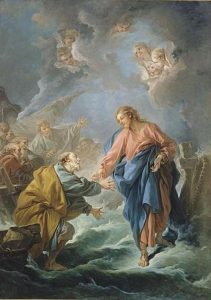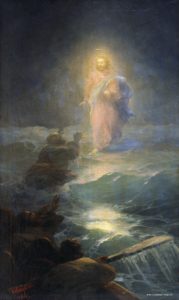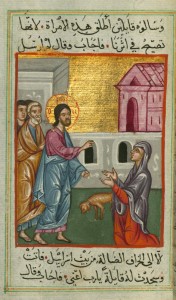Thoughts on Sunday’s Lessons for Aug. 9, 2020
First Reading (Track One): Genesis 37:1-4, 12-28
Faith can be a source of strength in the face of fear. We hear this twice in Sunday’s readings about Joseph and about Peter.

Saint Peter Attempting to Walk on Water (1766), oil painting on canvas by François Boucher (1703-1770). Cathédrale Saint-Louis de Versailles. (Click image to enlarge.)
Our Track One first readings about the bible’s dysfunctional first family continue into the fourth generation! Israel, formerly known as Jacob, loved Joseph more than any of his other children. This, not surprisingly, makes his brothers jealous. They briefly consider murdering Joseph, but decide to sell him into slavery instead. As it so often does, scripture shows us again that even the patriarchs weren’t noble people but flawed, broken, sometimes downright bad. Yet still God loved them, as God loves us. Joseph will eventually forgive his brothers, as God forgives us.
First Reading (Track Two): 1 Kings 19:9-18
In Sunday’s Track Two first reading, the Prophet Elijah is fleeing for his life from an angry Queen Jezebel, and he feels alone and afraid. No one else is on his side. He despairs. But he hears the wish of the Holy One – through an angel, a messenger – inviting him to go stand on a mountain to meet God. Soon a great wind shakes his world. Then an earthquake and finally a fire shatter the scene. But God is not in any of those. It is in the silence which follows the cataclysms that God’s voice is finally heard. God reassures Elijah, promising that he will go on to appoint Israel’s kings and prophets.
Psalm (Track One): Psalm 105:1-6, 16-22, 45b
Holding up Joseph as an example that God remains faithful even in hard times, these verses from Psalm 105 recall Joseph’s life as a slave in Egypt, his feet bruised in fetters and his neck choked in a heavy iron collar. But God was faithful to Joseph. From a beginning as a foreigner and a slave, Joseph gained the Egyptian king’s trust and eventually rose to a place of power in Pharaoh’s court. God has done marvelous things for the people, the Psalmist exults. Sing praises! Glory in God’s holy name!
Psalm (TrackTwo): Psalm 85:8-13
The reassurance that we hear God giving to Elijah amid his lonely fear in the first reading is echoed in this beautiful Psalm portion: God has forgiven our iniquity and blotted out our sins. Heaven and earth meet in truth and righteousness; righteousness and peace share a tender kiss, according to the Psalm’s beautiful poetry. God grants prosperity and a fruitful harvest, and all shall be well.
Second Reading: Romans 10:5-15
Paul continues addressing Rome’s Gentile Christian community and its Jewish Christians who have recently returned from exile, urging all to live in harmony and love one another. Salvation is for all through Jesus, Paul writes. He emphasizes that there is no distinction between Jew and Greek (Gentile): God is God of all, and is generous to all who recognize Jesus as Lord and call upon God’s name. Don’t judge our neighbors, Paul says, but proclaim the good news of the Gospel so that all may be saved.
Gospel: Matthew 14:22-33
The striking image of Jesus walking on the stormy waters of the Sea of Galilee makes this one of the most familiar Gospel stories. Jesus had sent the apostles ahead to cross the sea without him so he could take some time to pray alone. His grief at the beheading of his cousin John by Herod had been interrupted by the huge crowd that had to be fed with a few baskets of loaves and fishes, and now he sought solitude again. Meanwhile, the apostles, alone on the boat, are terrified when wind and waves rock the boat. Suddenly Jesus appeared, calmly walking across the stormy sea! Peter, first to believe that it really is Jesus, steps out onto the water to meet Jesus. But Peter’s faith isn’t strong enough to keep him from sinking without Jesus’ hand extended to save him. Then the wind eases, they get into the boat, and the awed disciples now worship Jesus as the Son of God.


